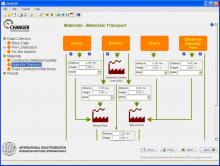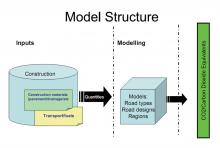What can contractors gain from a sustainability strategy and why is it now a vital business imperative? Abigroup, one of Australia's leading and most diverse national contractors, has developed a sustainability strategy suited to its industry, workforce and business. World Highways discusses this and other issues with Sarah Marshall, Abigroup's national environment and sustainability manager. In the past a responsible business was viewed as one that performed strongly within legal boundaries to maximise pro
Abigroup management is committed to engaging all employees in its sustainability strategy rather than it being seen solely as the responsibility of the environment teams
RSS1362 Abigroup, one of Australia's leading and most diverse national contractors, has developed a sustainability strategy suited to its industry, workforce and business.
World Highways discusses this and other issues with Sarah Marshall, Abigroup's national environment and sustainability manager.
In the past a responsible business was viewed as one that performed strongly within legal boundaries to maximise profit and shareholder return. Today the expectation of businesses is quite different.
"In the infrastructure industry, sustainability is now a powerful driver, with increasing concern for global warming and the environment prompting the integration of sustainability principles into the planning and delivery of projects across Australia," said Marshall.
While studies have shown that more than 50% of companies adopting sustainability strategies are motivated by ethics, values and codes of conduct, an increasing number now do so because it is financially beneficial to the organisation through increased business opportunities, innovation, reputation and reduced risk.
In October 2008, Abigroup directors and senior managers from across the business attended a sustainability workshop with leading sustainability researcher Professor Andrew Griffiths to explore what sustainability means to Abigroup and how it can be integrated into the business. The outcome of the workshop was the development of the Abigroup sustainability programme called Ability. The programme has five dimensions of interaction: Leadership, Our People, Environment, Society and Business.
"The strength of the model we've developed is its relevance to everyone in our business and its flexibility to adapt in the future as our business evolves," said Marshall. "The sustainability programme will constantly change and evolve over time to ensure a culture of continual improvement is fostered and to encourage innovation and best practice across all areas of our business."
With sustainability spanning so many activities and areas of the business, management recognised the need to introduce a tool to enable employees to easily identify and follow sustainability initiatives being taken by the company.
To keep Abigroup delivering on the key actions that comprise Ability, a sustainability panel will be established, pulling together personnel from key delivery areas. Importantly, they come from all areas of the business: a strategic decision by Marshall to ensure sustainability was 'owned' by all rather than seen as the responsibility of environmental teams. Panel members will be selected for their ability to lead the workforce to embrace initiatives and underpin the success of the strategy.
One example of the workforce leading the success of the programme was the development of a new Greenhouse Gas (GHG) Emission Reporting tool.
This tool provides Abigroup with the simple and thorough access to the accurate information it needs to comply with legislative requirements. The tool presents energy and emissions data in tables and forms that are designed to capture the basic information as it is presented by a standard invoice (for example gas, electricity, or fuel). This data is then transformed by backend calculations into a volume of CO2 emissions, which can be broken down by regions, business units, projects, or by source (for example electricity versus fuel).
Prior to implementing the solution Abigroup attempted to capture and measure emissions using excel spreadsheets.
"Not only was this difficult and time consuming, but also really inaccurate and unreliable. Because our GHG emission reporting is now incorporated into our financial reporting systems, and based around accounts payable data entry, we now have complete confidence that the data is an accurate measurement of energy consumption," Marshall continued. "Our Greenhouse Emissions Reporting Solution provides a solid foundation for not only meeting Abigroup's internal and external reporting requirements but also has the ability to feed into our clients' own energy and emissions reporting obligations."
To optimise the effectiveness of the new tool, Abigroup IT, finance, sustainability and environment teams worked together on its development then rolled it out to users across the business.
"Key to its success was that in training users, we intentionally veered away from training them on just the package, instead focusing on how their efforts would contribute to the sustainability strategy and ultimately lead to reduced emissions and a range of benefits down the track," said Marshall.
"Employee engagement is vital for any sustainability strategy to be a success. Communicating with our employees and ensuring they feel empowered to contribute and make a difference is a priority for Abigroup."
Abigroup's approach to sustainability extends beyond its own employees to its entire workforce including sub-contractors, suppliers and project partners. Marshall is also investigating the feasibility of rolling out the new emissions reporting software to Abigroup sub-contractors and assisting them with their reporting obligations.
"As a major contractor, others look to us for leadership and we anticipate and plan for flow-on benefits for our industry, particularly our sub-contractors and suppliers. Another example of this is the commitment Abigroup is showing to its female employees. A new programme woman@abigroup is focused on nurturing female employees and ensuring that at all stages of their career they are mentored and supported in their aspirations. In the male-dominated construction industry, Abigroup's senior management wanted to take this position to encourage others to support women and the very real and unique contribution they make to the industry and its long term success.
"To Abigroup, sustainability is about balancing growth and long-term business success with social and environmental responsibilities. The company's sustainability strategy demonstrates Abigroup's commitment to continuous improvement in sustainability, provides a status of current sustainability initiatives and identifies future actions that will benefit not only the financial success of the business, but our employees, the community, the environment and our clients."RSS
What can contractors gain from a sustainability strategy and why is it now a vital business imperative?
World Highways discusses this and other issues with Sarah Marshall, Abigroup's national environment and sustainability manager.
In the past a responsible business was viewed as one that performed strongly within legal boundaries to maximise profit and shareholder return. Today the expectation of businesses is quite different.
"In the infrastructure industry, sustainability is now a powerful driver, with increasing concern for global warming and the environment prompting the integration of sustainability principles into the planning and delivery of projects across Australia," said Marshall.
While studies have shown that more than 50% of companies adopting sustainability strategies are motivated by ethics, values and codes of conduct, an increasing number now do so because it is financially beneficial to the organisation through increased business opportunities, innovation, reputation and reduced risk.
In October 2008, Abigroup directors and senior managers from across the business attended a sustainability workshop with leading sustainability researcher Professor Andrew Griffiths to explore what sustainability means to Abigroup and how it can be integrated into the business. The outcome of the workshop was the development of the Abigroup sustainability programme called Ability. The programme has five dimensions of interaction: Leadership, Our People, Environment, Society and Business.
"The strength of the model we've developed is its relevance to everyone in our business and its flexibility to adapt in the future as our business evolves," said Marshall. "The sustainability programme will constantly change and evolve over time to ensure a culture of continual improvement is fostered and to encourage innovation and best practice across all areas of our business."
With sustainability spanning so many activities and areas of the business, management recognised the need to introduce a tool to enable employees to easily identify and follow sustainability initiatives being taken by the company.
To keep Abigroup delivering on the key actions that comprise Ability, a sustainability panel will be established, pulling together personnel from key delivery areas. Importantly, they come from all areas of the business: a strategic decision by Marshall to ensure sustainability was 'owned' by all rather than seen as the responsibility of environmental teams. Panel members will be selected for their ability to lead the workforce to embrace initiatives and underpin the success of the strategy.
One example of the workforce leading the success of the programme was the development of a new Greenhouse Gas (GHG) Emission Reporting tool.
This tool provides Abigroup with the simple and thorough access to the accurate information it needs to comply with legislative requirements. The tool presents energy and emissions data in tables and forms that are designed to capture the basic information as it is presented by a standard invoice (for example gas, electricity, or fuel). This data is then transformed by backend calculations into a volume of CO2 emissions, which can be broken down by regions, business units, projects, or by source (for example electricity versus fuel).
Prior to implementing the solution Abigroup attempted to capture and measure emissions using excel spreadsheets.
"Not only was this difficult and time consuming, but also really inaccurate and unreliable. Because our GHG emission reporting is now incorporated into our financial reporting systems, and based around accounts payable data entry, we now have complete confidence that the data is an accurate measurement of energy consumption," Marshall continued. "Our Greenhouse Emissions Reporting Solution provides a solid foundation for not only meeting Abigroup's internal and external reporting requirements but also has the ability to feed into our clients' own energy and emissions reporting obligations."
To optimise the effectiveness of the new tool, Abigroup IT, finance, sustainability and environment teams worked together on its development then rolled it out to users across the business.
"Key to its success was that in training users, we intentionally veered away from training them on just the package, instead focusing on how their efforts would contribute to the sustainability strategy and ultimately lead to reduced emissions and a range of benefits down the track," said Marshall.
"Employee engagement is vital for any sustainability strategy to be a success. Communicating with our employees and ensuring they feel empowered to contribute and make a difference is a priority for Abigroup."
Abigroup's approach to sustainability extends beyond its own employees to its entire workforce including sub-contractors, suppliers and project partners. Marshall is also investigating the feasibility of rolling out the new emissions reporting software to Abigroup sub-contractors and assisting them with their reporting obligations.
"As a major contractor, others look to us for leadership and we anticipate and plan for flow-on benefits for our industry, particularly our sub-contractors and suppliers. Another example of this is the commitment Abigroup is showing to its female employees. A new programme woman@abigroup is focused on nurturing female employees and ensuring that at all stages of their career they are mentored and supported in their aspirations. In the male-dominated construction industry, Abigroup's senior management wanted to take this position to encourage others to support women and the very real and unique contribution they make to the industry and its long term success.
"To Abigroup, sustainability is about balancing growth and long-term business success with social and environmental responsibilities. The company's sustainability strategy demonstrates Abigroup's commitment to continuous improvement in sustainability, provides a status of current sustainability initiatives and identifies future actions that will benefit not only the financial success of the business, but our employees, the community, the environment and our clients."RSS








